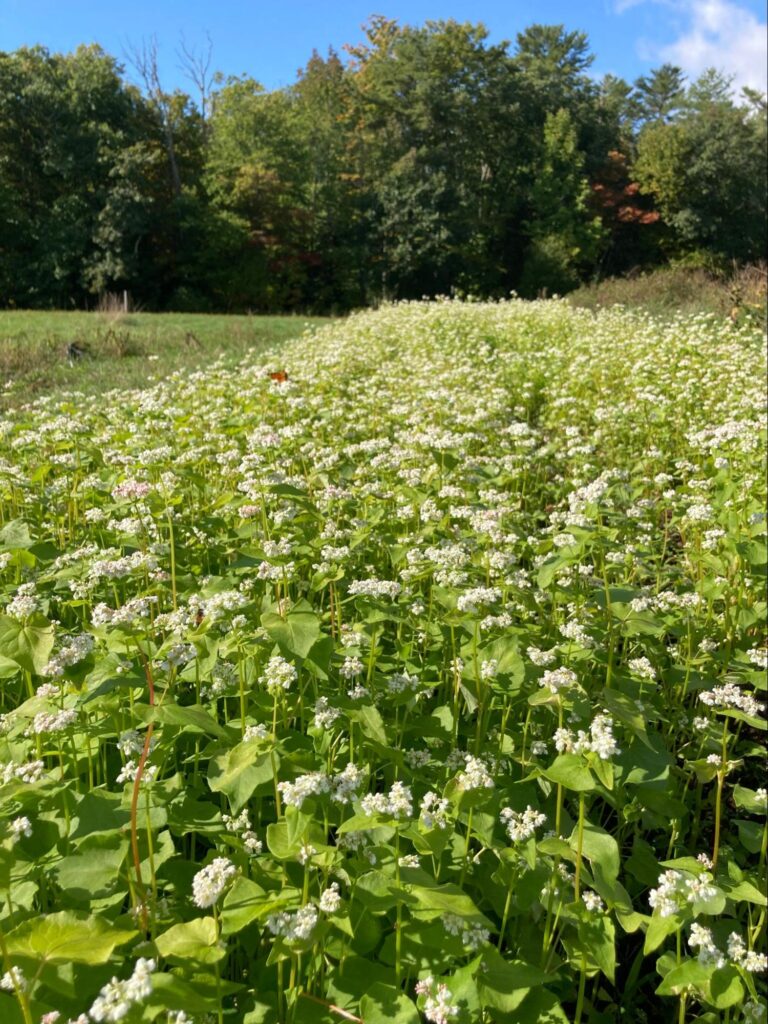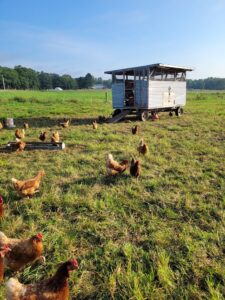Thomas Prohl, our Farm Operations and Systems Manager has taken a moment to reflect on what this summer has meant to our Fruit and Vegetable and Livestock Operations and Wolfe’s Neck Center as a whole.
~~
Another summer is slowly fading into fall here on the farm. Cold dew wets our boots each morning as we walk through the pasture to bring our cows in for milking, open our greenhouses, and let our chickens out to start their day. All is dark and quiet on these early fall mornings, farmers feel the change of the seasons under dark skies before the sun breaks through cloudy horizons.

While this summer was great beach weather, it proved challenging to produce our crops and livestock as sun beat down on dry pastures and sweltering hot greenhouses. Despite the dry conditions, I am incredibly proud of the job our farm team and apprentices have put forth this season. Cool season cover crops create a green and white mosaic currently in our fruit and vegetable production plot. Pollinators and native bees swarm amongst the flowering buckwheat, harvesting nectar to tide them through the long winter. Roots dig deep, anchoring our soils and protecting against erosion brought on by heavy fall rains.
Our pastures also look excellent all things considered. We pulled the dairy herd off pasture for 38 days this summer to protect our valuable soils and grasses we work so hard to steward. Our cows didn’t seem to mind – they relaxed in the shade of the barn and ate last year’s hay we rolled out to them in the pasture. The herd is now back on pasture enjoying fresh forage, which has rebounded with September’s rain. Hay is also being cut, baled and stored for the winter. I am thankful for the resurgence of the grass, and outstanding grazing management by our dairy team. The great haying and grazing conditions this September are our reward for not asking too much of the land during the dry spell.

Our pastured poultry continued their daily routine of laying 22 dozen eggs daily this summer, despite the dry conditions. However, their affinity of digging and dust bathing as a means of cooling off plagued me for the duration of our 90-day dry spell. The birds instinctually scratch and dig into the earth to expose the wealth of insects and critters that nourish them. In exceptional drought conditions in which our soils will remain bone dry to a depth of 10-14 inches.
These insects dive deeper into cooler soils, and the hen’s follow, digging craters over a foot deep in our pastures. This drought digging poses a risk to our cows who graze pastures behind the hens. The only solution is to accelerate the movement of the pastured birds from a paddock move every four to five days to a move every two to three days so the hens had less time to dig. This came at the expense of excess labor and many early mornings with wet boots and a headlamp!
It’s this time of year I reflect on farming, the season we’ve had and the season that stands before us. Farming is a team sport, success is possible farming alone, but such a beautiful thing to share with others who relish in its triumphs and challenges. I love growing, succeeding, and failing with my team, adapting to what nature provides us, and stewarding the land in community with such devoted farmers and incredible people.
← Back to Blog